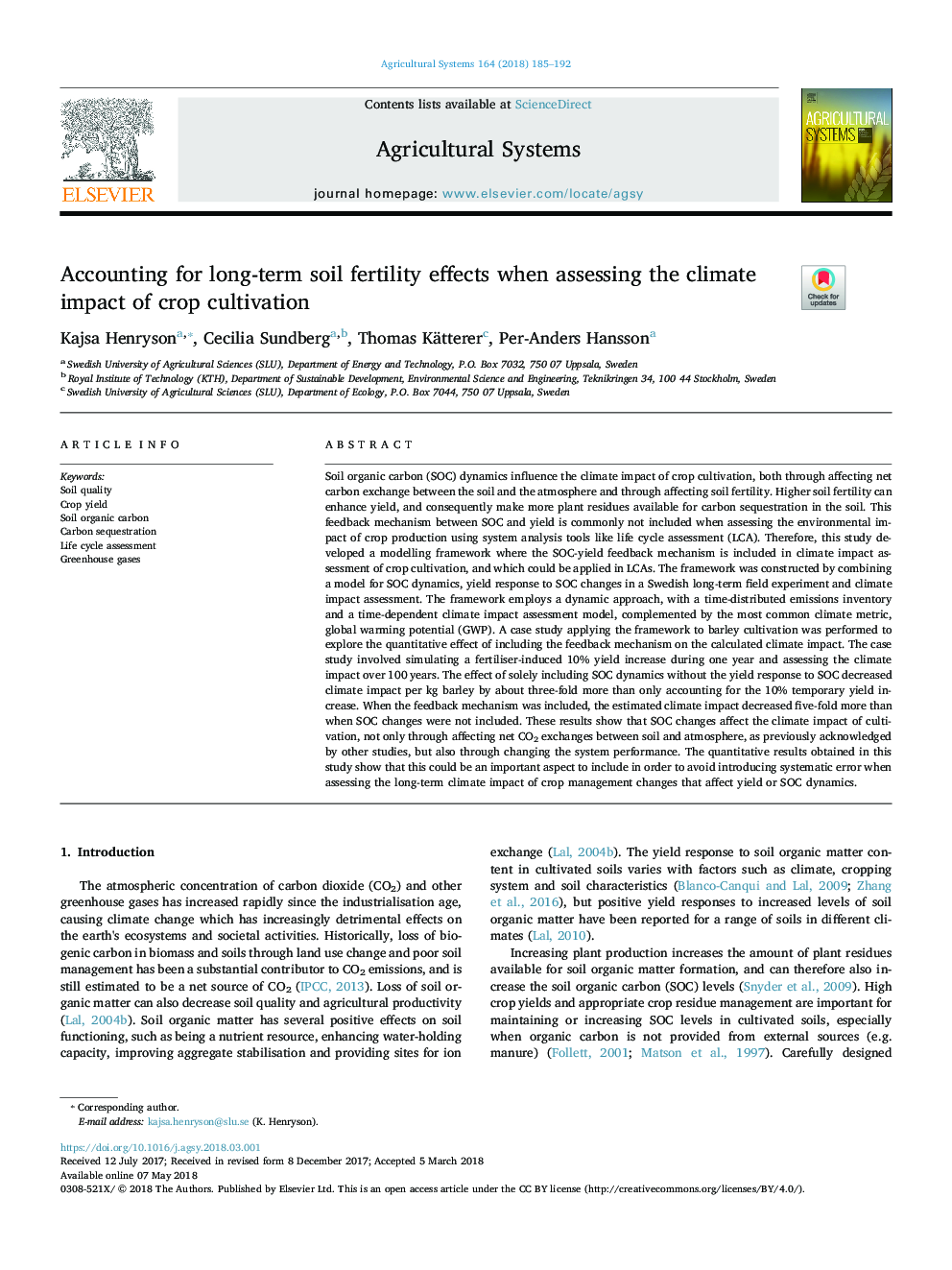| کد مقاله | کد نشریه | سال انتشار | مقاله انگلیسی | نسخه تمام متن |
|---|---|---|---|---|
| 8874977 | 1623206 | 2018 | 8 صفحه PDF | دانلود رایگان |
عنوان انگلیسی مقاله ISI
Accounting for long-term soil fertility effects when assessing the climate impact of crop cultivation
ترجمه فارسی عنوان
حسابداری برای اثرات باروری خاک درازمدت در هنگام ارزیابی تاثیرات آب و هوایی محصول
دانلود مقاله + سفارش ترجمه
دانلود مقاله ISI انگلیسی
رایگان برای ایرانیان
کلمات کلیدی
کیفیت خاک، بازده محصول، کربن آلاینده خاک تداخل کربن، ارزیابی چرخه حیات، گازهای گلخانه ای،
موضوعات مرتبط
علوم زیستی و بیوفناوری
علوم کشاورزی و بیولوژیک
علوم کشاورزی و بیولوژیک (عمومی)
چکیده انگلیسی
Soil organic carbon (SOC) dynamics influence the climate impact of crop cultivation, both through affecting net carbon exchange between the soil and the atmosphere and through affecting soil fertility. Higher soil fertility can enhance yield, and consequently make more plant residues available for carbon sequestration in the soil. This feedback mechanism between SOC and yield is commonly not included when assessing the environmental impact of crop production using system analysis tools like life cycle assessment (LCA). Therefore, this study developed a modelling framework where the SOC-yield feedback mechanism is included in climate impact assessment of crop cultivation, and which could be applied in LCAs. The framework was constructed by combining a model for SOC dynamics, yield response to SOC changes in a Swedish long-term field experiment and climate impact assessment. The framework employs a dynamic approach, with a time-distributed emissions inventory and a time-dependent climate impact assessment model, complemented by the most common climate metric, global warming potential (GWP). A case study applying the framework to barley cultivation was performed to explore the quantitative effect of including the feedback mechanism on the calculated climate impact. The case study involved simulating a fertiliser-induced 10% yield increase during one year and assessing the climate impact over 60â¯years. In this specific case, the effect of solely including SOC dynamics without the yield response to SOC decreased climate impact per kg barley by about three-fold more than only accounting for the 10% temporary yield increase. When the feedback mechanism was included, the estimated climate impact decreased five-fold more than when SOC changes were not included. These results show that SOC changes can affect the climate impact of cultivation, not only through affecting net CO2 exchanges between soil and atmosphere, as previously acknowledged by other studies, but also through changing the system performance. The quantitative results obtained in this study show that this could be an important aspect to include in order to avoid introducing systematic error when assessing the long-term climate impact of crop management changes that affect yield or SOC dynamics.
ناشر
Database: Elsevier - ScienceDirect (ساینس دایرکت)
Journal: Agricultural Systems - Volume 164, July 2018, Pages 185-192
Journal: Agricultural Systems - Volume 164, July 2018, Pages 185-192
نویسندگان
Kajsa Henryson, Cecilia Sundberg, Thomas Kätterer, Per-Anders Hansson,
